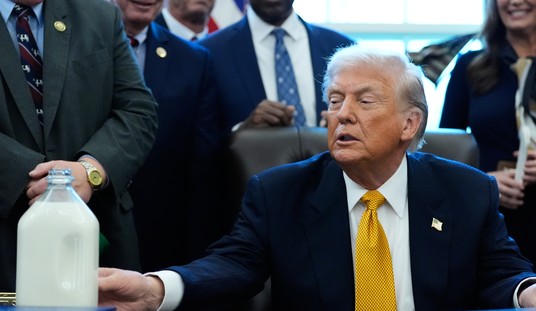In a series of unusual moves, the Supreme Court announced that it would extend oral arguments on the lawsuits against ObamaCare to six hours, extending the record for the length of time dedicated to a case in modern court history. The court also appointed two outside attorneys to debate a question that neither Republicans or Democrats want to raise, and it might provide the justices with an avenue to punt on the merits of ObamaCare for another two years:
The court will now spend an hour and a half determining whether it can make a ruling before the mandate takes effect in 2014. A separate federal law, known as the Anti-Injunction Act, bars lawsuits over new taxes until those taxes have taken effect.
The states, NFIB and the Obama administration all say the Anti-Injunction Act should not stop the court from ruling on the healthcare mandate. But in part because a lower court cited the law, the justices have to consider it.
The court will hear from a third-party attorney for 40 minutes and the Justice Department for 30 minutes. NFIB and the states will get 20 minutes.
TPM DC’s Sahil Kapur notes that this could just be due diligence — or a way to get off the hook for a ruling on the core issues for another two years:
The Supreme Court is poised to rule this summer on the constitutionality of the health care reform law’s requirement that Americans buy insurance or pay a tax penalty. But it has the legal option to delay a decision until at least 2014, and although the possibility has received little attention, new evidence suggests that justices are considering it more strongly.
The temporary escape hatch involves the Anti-Injunction Act, an age-old law that says courts may not halt a tax that isn’t yet being collected. (Under the Affordable Care Act, it won’t be collected until 2014.) Although the Fourth Circuit Court of Appeals last fall tossed out a lawsuit against the mandate on this basis, most courts have decreed that the statute doesn’t apply here. …
This might just be the high court doing its due diligence — the expectation remains that a final decision will be handed down by the end of June. But observers have noted that, judicial reasoning aside, Chief Justice John Roberts in particular may not want the Supreme Court to become an election-year piñata so soon after the 2010 Citizens United ruling. No matter the decision, the court is expected to take plenty of heat from the losing side.
I’m inclined to believe that this is a way to make sure that the court has covered all its bases before making what is likely to be one of the most important Supreme Court decisions in decades. Complicating this consideration is the Obama administration’s vacillating stands on whether ObamaCare’s mandate penalties are a tax at all. They’re arguing that it is a tax in order to bolster their argument that the mandate is based on firm constitutional grounds, but publicly have either denied or downplayed the tax argument in order to avoid being accused of imposing a massive tax hike on the middle class. The legal argument will take precedence, but attorneys opposing the mandate will be sure to note those occasions when the administration that uses the tax argument in legal briefs told the American people the opposite.
Also, the Supreme Court granted cert in these ObamaCare cases on a rather accelerated schedule. Had they wanted to avoid making a ruling before the election, they could have easily waited until other cases on a broader range of issues cleared the appellate courts. For instance, Ave Maria University filed suit today over the HHS contraception mandate, and it’s not difficult to imagine more lawsuits on emerging issues that all relate back to the federal government’s power to rule by diktat through ObamaCare.
Instead, they granted cert fairly quickly and committed to an early resolution, which looks much more like they want to address the core issues before the law goes into effect. The extended argument over the AIA may be just to satisfy a minority of justices that this acceleration is legitimate in order to get them on board an eventual and comprehensive resolution to the dispute.
Update: Er … series of unusual moves, not serious. Time for more coffee.







Join the conversation as a VIP Member